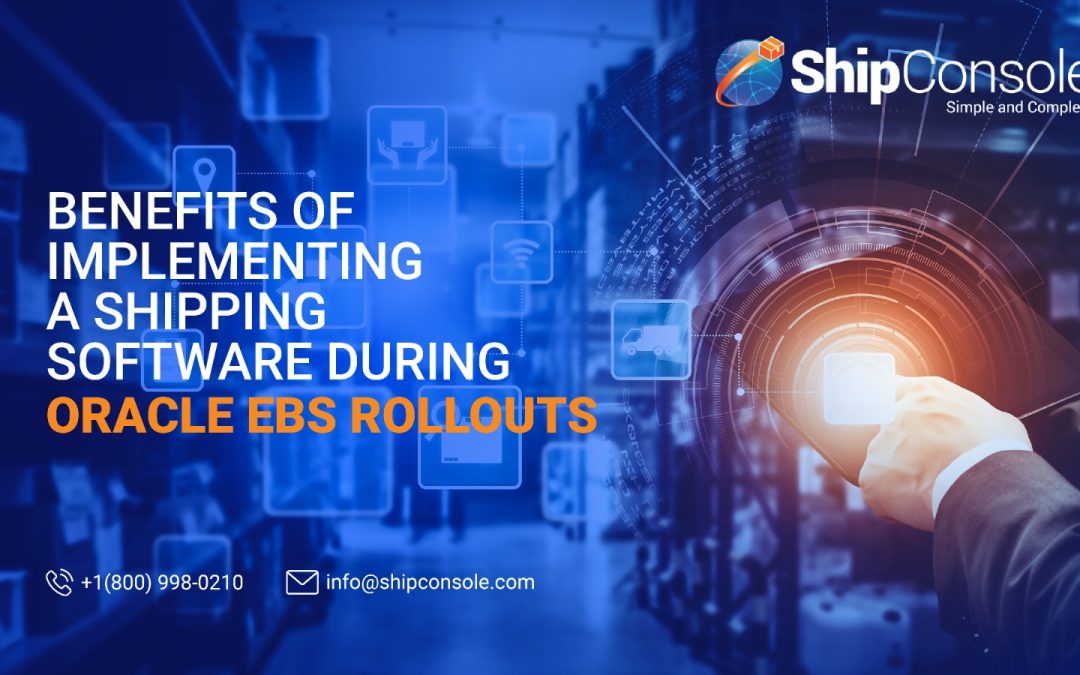The expansion of business operations in organizations brings about a myriad of challenges, especially when coupled with the need to upgrade shipping operations and systems. In the context of an Oracle E-Business Suite (EBS) rollout, the integration of shipping systems plays a pivotal role in streamlining logistics and ensuring a smooth transition. In this blog post, we will explore the challenges associated with an Oracle EBS rollout in an organization, highlight the importance of upgrading shipping operations, and discuss how pre-built shipping software can be seamlessly integrated to enhance efficiency.
Challenges of an Oracle EBS Rollout in an Organization:
Rolling out Oracle E-Business Suite to an organization is a complex endeavor that involves adapting the existing business processes to align with the standardized features of EBS. Some challenges associated with this process include diverse infrastructures, data migration complexities, user training, and customization requirements. Amidst these challenges, upgrading shipping operations emerges as a crucial aspect that demands careful consideration.
The Ideal Time to Upgrade Shipping Systems:
An Oracle EBS rollout provides an opportune moment to upgrade shipping systems in parallel. Upgrading shipping operations concurrently with the EBS rollout allows for integrated shipping solutions that streamline logistics, reduce manual errors, and enhance overall supply chain efficiency. This strategic approach ensures that the shipping processes aligns seamlessly with the standardized workflows within Oracle EBS.
How Pre-Built Shipping Software Facilitates Alignment:
Implementing pre-built shipping software for Oracle EBS, such as ShipConsole, simplifies the alignment process and ensures a smooth transition. ShipConsole is designed to seamlessly integrate with Oracle EBS, offering out-of-box compatibility and reducing the complexities associated with customizations. This alignment enhances visibility, accuracy, and control over shipping operations.
User-Friendly Training and Configuration for Seamless Adoption:
Integrating ShipConsole into the Oracle EBS rollout ensures a quick learning curve for new users, thanks to its easy-to-use interface and structured training modules. The system’s high degree of configuration empowers users to adjust it to their specific workflow preferences, making the transition smooth. ShipConsole’s user-centric approach not only speeds up adoption but also enhances satisfaction and productivity, contributing to an efficient and disruption-free Oracle EBS rollout.
Benefits and Value of Pre-built Oracle-Integrated Shipping Software:
Out-of-Box Integration:
ShipConsole is Oracle-certified pre-built shipping software that comes with pre-configured connectors, ensuring seamless integration with Oracle EBS. This eliminates the need for extensive customizations and accelerates the deployment timeline. Businesses can go live within 4-8 weeks.
Freight Quoting at Sales Order:
ShipConsole enables real-time freight quoting at the sales order stage, allowing for accurate cost estimations and better decision-making during the order fulfillment process.
One Platform for Domestic and International:
A unified shipping platform such as ShipConsole supports both domestic and international shipments, providing a centralized solution for all shipping needs. This reduces the complexity of managing multiple systems and enhances operational efficiency.
Multi-Carrier, Multi-Mode Solution for Comprehensive Parcel/LTL Coverage:
ShipConsole consolidates shipping operations into one system providing a centralized platform to manage both parcel and LTL shipments efficiently. A unified solution not only simplifies the shipping process but also enhances flexibility, allowing businesses to seamlessly handle diverse shipping needs within the Oracle EBS environment.
Tracking, POD, and Email Notifications:
ShipConsole offers advanced tracking capabilities, proof of delivery (POD) features, and automated email notifications. This not only improves customer satisfaction but also provides visibility into the shipping process.
Reports & Analytics:
Comprehensive reporting and analytics tools within ShipConsole offer insights into shipping performance, costs, and trends. This data-driven approach empowers organizations to make informed decisions and optimize shipping strategies.
Conclusion:
In the ever-evolving landscape of business operations, the challenges associated with an Oracle EBS rollout in an organization are inevitable. However, by strategically upgrading shipping operations in parallel with the EBS rollout and integrating pre-built shipping software such as ShipConsole, organizations can overcome these challenges and achieve a streamlined, efficient, and integrated supply chain. The benefits of out-of-box integration, freight quoting, unified platforms, tracking capabilities, and robust analytics underscore the value of this strategic approach, paving the way for a successful Oracle EBS rollout and optimized shipping operations.

Pavan Telluru works as a Product Manager at ShipConsole. He brings over a decade of experience to his current role where he’s dedicated to conducting product demos to prospects and partners about how to organizations can efficiently manage their shipping execution process. He also leads marketing efforts at ShipConsole.


